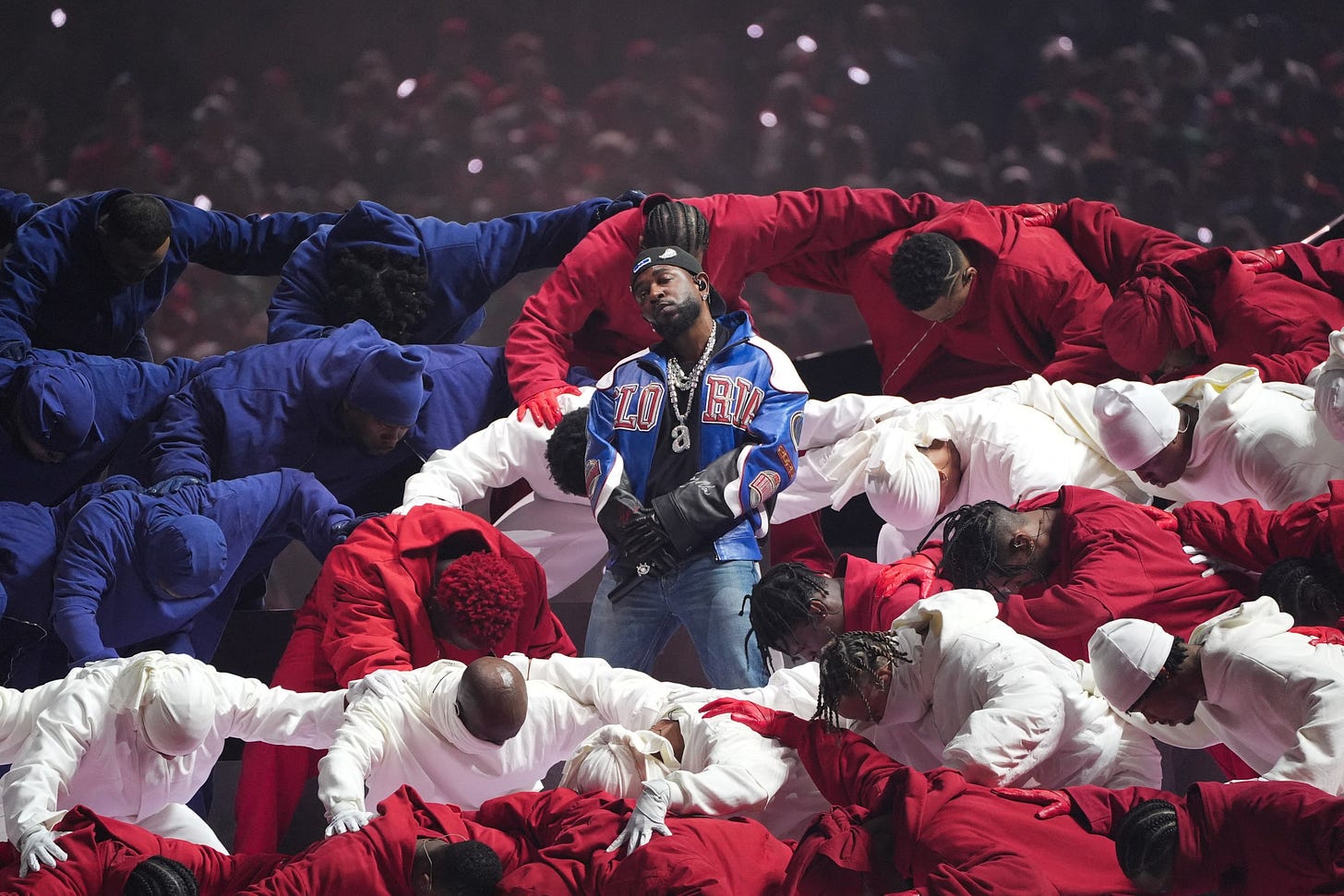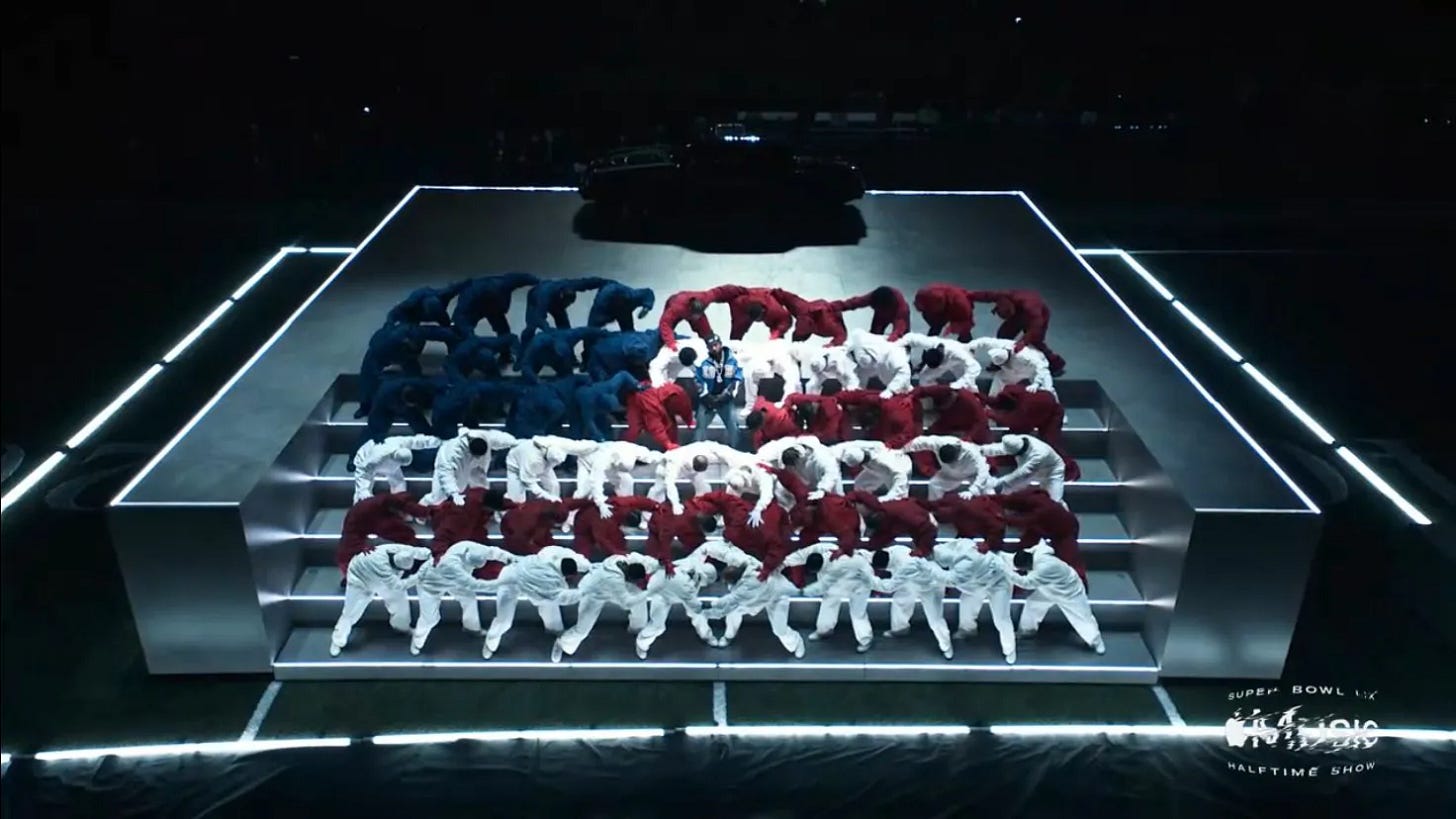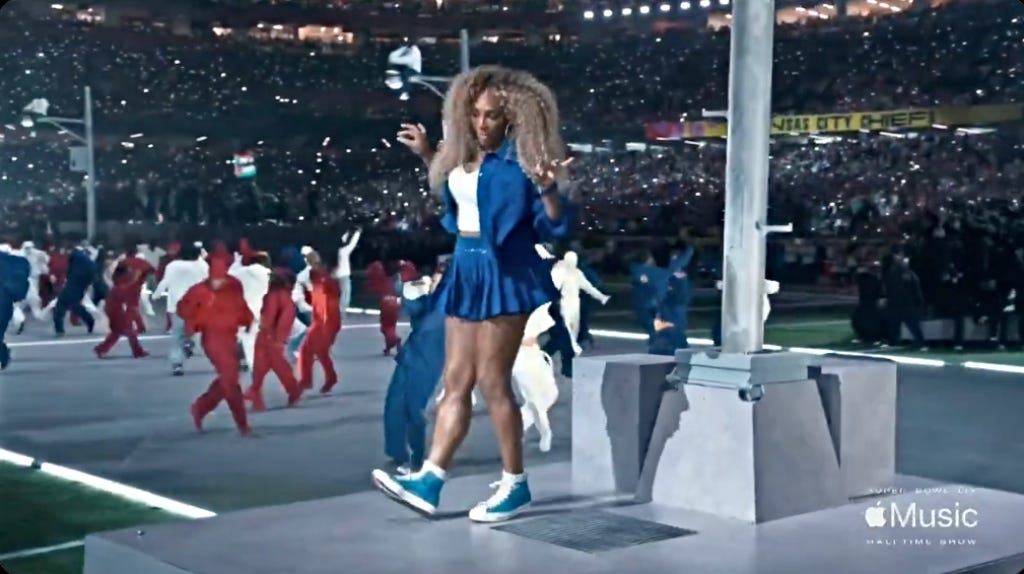Special: Kendrick
breaking down Kendrick Lamar's Super Bowl halftime performance
I did not watch the Super Bowl. I did watch Kendrick’s halftime performance, with my mouth literally agape for most of it. If you think Taylor Swift is the king of hidden meaning, you do not know Kendrick’s game. Let’s go:
People say that 2024 was Kendrick’s year of being a hater, but as a fan since To Pimp a Butterfly (2015), I know that Kendrick’s been a hater. Specifically, besides hating Drake, Kendrick hates the neocolonialist white supremacist establishment of the United States of America and its slavery-born carceral system—which, conveniently, are perfectly symbolized by the Super Bowl.
In terms of realms of American society in which power is generated by Black people and held by white people, no industries compare to sports and music. The Super Bowl is in some ways the biggest night of the year for both; the it is consistently the most watched televised event all year, and captures a different audience than the one that halftime performers usually reach. All of the Super Bowl halftime headliners have been Black since 2021, a curious phenomenon in a country increasingly regressing towards outright racism in its politics.
Kendrick has a long history of characters who only appear to speak in interludes, providing a thematic backbone to the story he creates with his songs. Samuel Jackson’s portrayal of Uncle Sam, a recurring character in Kendrick’s work, opens the show, pontificating, “It’s your uncle, Sam. And this is the great American game!” The friendly tone and emphasis of phrasing (“it’s your uncle, Sam”), feel intentional; Kendrick frequently engages with an Uncle Sam that attempts to charm him into a feeling of false safety, like the one in “Wesley’s Theory:”
What you want you? A house or a car?
Forty acres and a mule, a piano, a guitar?
Anythin', see, my name is Uncle Sam, I'm your dog
Motherfucker, you can live at the mall
I know your kind (That's why I'm kind)
Don't have receipts (Oh, man, that's fine)
Pay me later
But even before this, the televised version of the performance clearly showed the words “Game Over” and symbols on the field, a Playstation controller whose buttons became stages for the ensuing performance. The lights flickered out a cheat code pattern (I don’t know enough about video games to decode this, but theories welcome in the comments).
Red, white, and blue clad dancers came pouring out of the car Kendrick stood atop (honestly, an extremely cool effect) as he rapped an unreleased track from GNX (2024). “The revolution ‘bout to be televised,” he said. It’s an interesting commentary on the surveillance state, on the inversion of the iconic Gil Scott-Heron quote without the alteration of its meaning, on our collective desensitization to violence, especially violence against Black people, due to the proliferation of both the violence itself and video evidence of it on traditional and social media. “You picked the right time but the wrong guy,” he continues. I like to think that this line is a warning—Kendrick telling the establishment that he will not play a sanitized show for the Super Bowl, especially with his long running theme of disdain for Uncle Toms in his work.
After an excerpt from “squabble up,” Uncle Sam interrupts to say that the performance is “too ghetto.” “Mr. Lamar, do you really know how to play the game?” he asks. Kendrick’s position in American mainstream society is interesting at this juncture; he was just awarded a Song of the Year Grammy for “Not Like Us,” his explicit beef track, he’s the first solo rapper to headline the Super Bowl halftime show, and he’s basically banished his opp from the face of the earth (or at least America). He’s definitely afforded a level of wiggle room for social commentary right now that not many Black artists have had in the past, especially on the biggest stage that traditional media has to offer. That, and the President was in attendance. He took that opportunity and ran with it.
The American flag symbolism can only be read ironically by Kendrick fans, but it’s easy to see why he chose it—he couldn’t possibly be reprimanded for showing the flag on America’s biggest night. Kendrick splits the flag during his performance of “HUMBLE,” potentially signifying a divided country. The inclusion of this symbol in this performance reminds me of the album cover for To Pimp a Butterfly (2015), which depicts the “aftermath of a Black revolution on the White House lawn.”
I’m going to take a moment now for Kendrick’s pants. Actually, I’m just going to show a screenshot of a tw**t:
And the chain! A for Aubrey? A for America, lowercase in a blatant show of disrespect? A for A minor? The last one is most likely, but I think there are layers to Kendrick’s choices, and what he wears is onscreen for the entirety of the performance—he certainly put thought into all of it.
Moving on. The set from this point on looks suspiciously like a prison yard, especially with the dancers dressed in sweat suits and the gray fluorescent lights. Kendrick has been openly critical of the carceral system, especially in Compton, since the beginning with good kid, m.A.A.d city (2012), an album largely about gang and police violence. Songs like “Collect Calls” depict the personal and cyclical effects of the carceral system, while in “Sing About Me, I’m Dying of Thirst” Kendrick compares gang and police violence.
Kendrick brings out SZA to perform some of their hits (two queens, joint slay, etc), but before that there’s another Uncle Sam interjection: “I see you brought your homeboys with you. The old culture cheat code! Scorekeeper: deduct one life,” as the “Give a Helping Hand” sample plays:
Give a helping hand
To your fellow man
In one layer, this “life” is a reference back to the video game that Kendrick is playing on the Playstation controller. On another, it’s a commentary on how easily the country can take the literal lives of Black people in a show of collective control. In this way, the commentary seems to extend to critique the American understanding of Black culture as a monolith, lives interchangeable for each other.
After an excerpt from “peekaboo,” Kendrick brings back one of my favorite signature sounds: the strange, feminine but robotic vocal chorus from “King Kunta” and other TPAB tracks. He teases “Not Like Us” and then switches gears to the SZA collaboration tracks.
Uncle Sam makes a comment about Kendrick losing the audience, and public backlash to this performance confirms that a lot of people were either confused by the symbolism, didn’t think he performed enough hits, or just flat out did not know who Kendrick was. I was honestly surprised to find out that Kendrick was doing this show; the Super Bowl of all things is so antithetical to his ethos as an artist and a Black man from Compton that I couldn’t imagine him bending for a check from the Man. Rather, he used the biggest stage in the world to say something real, shrouded in lace for fans and velvet for Republicans.
The next section is interesting to me because of the Army formations, the marching, the juxtaposition of these visual elements with the words Kendrick is actually rapping:
I hate people that feel entitled
Look at me crazy 'cause I ain’t invite you
Oh, you important? You the moral to the story? You endorsin'?
Motherfucker, I don't even like you
This to me is the most poignant moment of the entire set. Later, he gets into the Drake beef and settles his private score on the public stage, but despite “All the Stars” being his slower, calmer, more palatable hit written for a movie that packaged Blackness for a traditionally white audience, Kendrick flat out says that he does not care about the endorsement from the establishment, in this case, the Super Bowl.
The military formation can mean many things. Perhaps it’s a play on the traditional halftime show, in which a marching band, whose roots are squarely in the military machine, plays in formation. Perhaps it’s a further development on the relationship between the prison industrial complex and the labor of conflict, a commentary on whom Kendrick sees on the front lines of the culture and literal wars in America’s future. Perhaps it’s a return to a theme he’s been vocal on before, that Uncle Toms fall in line and become fodder for a battle in which they have no stake, brainwashed by pressure to conform to white will. Regardless, the effect is striking; with SZA and Kendrick spread out across the field it seems almost that this will be the finale.
Uncle Sam praises Kendrick (“That’s what America wants!”) as the “Not Like Us” instrumentation begins. “It’s a cultural divide,” Kendrick says, “Forty acres and a mule, this is bigger than the music.” Kendrick knows that he was hired to play “Not Like Us,” to duel out the rap battle that captured American attention in 2024. But the context of this rivalry provides a deeper meaning. It’s no secret that Kendrick doesn’t really think Drake is Black. There’s a lot to unpack there, but when this intro to “Not Like Us” is contextualized as Kendrick vs the white man, his commentary recenters this Super Bowl performance around reparations, the place of Black icons and traditions in a white culture which is inherently derivative, and the meaning of his presence at this event.
This image has got to be one of the best things to come out of American television in years. Kendrick actually says Drake’s name, on live international television, and gives him this smile: “I hate you like I’m young.” The whole stadium said “a minor.” Drake is cooked.
Serena Williams cripwalking during Kendrick’s performance while he calls Drake a pedophile is… cold. First of all, Serena is Drake’s ex. Second, Drake allegedly stalked her after they broke up in 2015 and has publicly rapped about their relationship since. Third, Serena was criticized for cripwalking at Wimbledon in 2012, which she won.
Kendrick tells the crowd that they came “all the way from Compton, California to come party with y’all,” reminding this audience whose tickets averaged $8,000 that he’s from one of the most disenfranchised cities in America. “tv off” is an interesting choice for this highly televised event, harkening back to his first comment, “The revolution ‘bout to be televised.” He looks right into the camera as it cuts to black.
Theories about this performance that I missed welcome in the comments! If you like Drake, I’m sorry.











guys… no one corrected my lyric mishear “I hear you like ‘em young”… do you all secretly hate me…
of course, smiling uncle sam(uel) also plays on racist depictions of black people (like uncle ben and aunt jemima), his bits reminded me of george clinton's cover concept for his 1986 "r&b skeletons in the closet" album ("with just a little more effort, george could be a fine credit to his race")
the military imagery plays on the fact that the military has been one of the few "career opportunities" for people of color (like colin powell becoming a four-star general) outside sports and entertainment (maybe not under the present government, though)